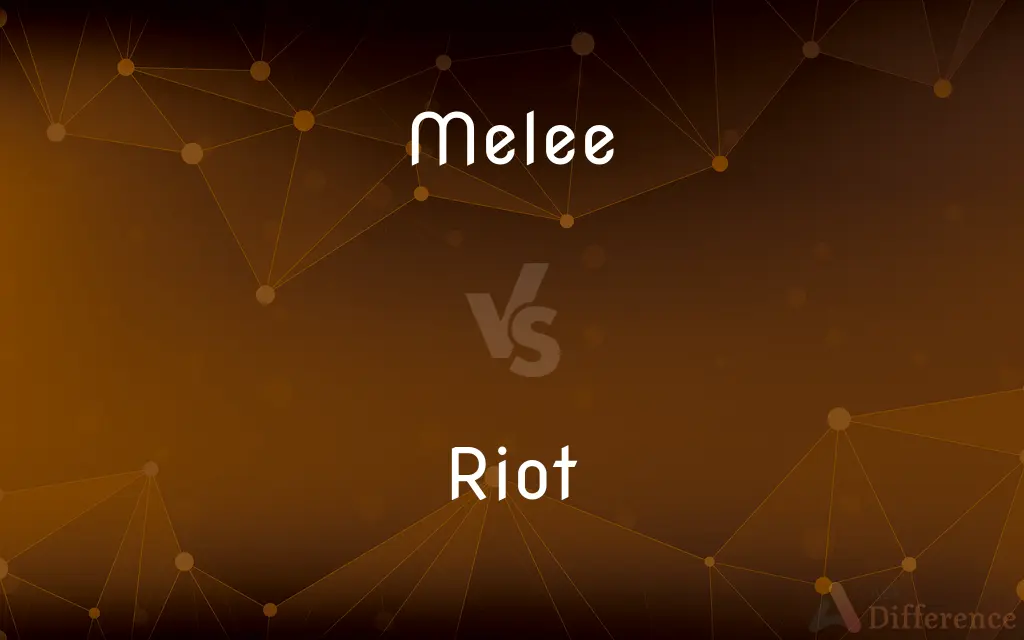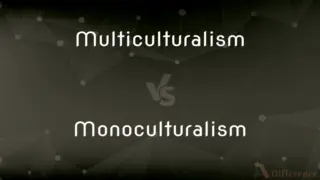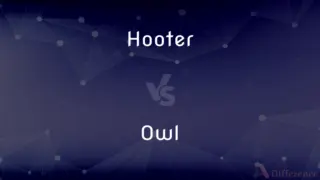Melee vs. Riot — What's the Difference?
By Fiza Rafique & Maham Liaqat — Updated on March 28, 2024
A melee is a close-quarters, often disorganized fight between individuals, while a riot is a larger, chaotic public disturbance against authority.

Difference Between Melee and Riot
Table of Contents
ADVERTISEMENT
Key Differences
Melee refers to a close-quarters fight or skirmish involving a small number of people, often characterized by confusion and lack of structure. It typically occurs spontaneously and involves hand-to-hand combat or the use of melee weapons. On the other hand, a riot is a significant public disturbance involving a group of people expressing their opposition or dissatisfaction towards an authority or policy, usually in a violent and chaotic manner.
While a melee is generally limited to physical confrontations between individuals or small groups, riots encompass a wider range of activities including protests, vandalism, looting, and clashes with law enforcement. Riots are often driven by political, social, or economic grievances, whereas melees can result from personal disputes, competitive events, or spontaneous altercations.
The scale and impact of melees and riots differ significantly. A melee might result in injuries to the participants and can be quickly contained, but rarely has broader social or political implications. A riot, however, can lead to widespread damage to property, significant injuries, or even fatalities, and may provoke a substantial law enforcement or military response.
The motivations behind melees and riots also differ. Melees often arise from immediate, personal conflicts or the heat of the moment, lacking any predefined goal or cause. Riots, while they may begin spontaneously, are usually fueled by deeper, underlying issues such as injustice, oppression, or dissatisfaction with societal conditions.
In terms of legal and societal responses, individuals involved in melees might face charges related to assault or disorderly conduct, depending on the jurisdiction and circumstances. Participants in riots, however, could be subjected to more severe legal repercussions, including charges of rioting, vandalism, arson, or other felonies, reflecting the greater threat to public order and safety that riots represent.
ADVERTISEMENT
Comparison Chart
Definition
A disorganized, close-quarters skirmish between a small number of people.
A large-scale public disturbance against authority, involving violent behavior.
Scale
Small scale, involving individuals or small groups.
Large scale, potentially involving hundreds or thousands of participants.
Motivation
Often personal disputes or spontaneous altercations.
Political, social, or economic grievances against authority.
Legal Response
Assault or disorderly conduct charges.
Charges of rioting, vandalism, arson, and other felonies.
Impact
Limited to immediate physical confrontations.
Widespread property damage, injuries, or fatalities, and significant societal or political implications.
Compare with Definitions
Melee
A confused struggle or fight involving a few people, close up.
The barroom brawl quickly turned into a chaotic melee.
Riot
A public disturbance caused by a group expressing grievance against authority.
The peaceful protest escalated into a riot by nightfall.
Melee
Close-quarters combat without the use of firearms.
The medieval battle scene was dominated by melee fighting.
Riot
An instance of mass public violence.
The riot resulted in several downtown stores being looted.
Melee
A term used in gaming to describe hand-to-hand combat.
In many video games, players can choose between melee and ranged weapons.
Riot
A situation of unchecked chaos in public spaces.
The power outage on New Year’s Eve caused a riot in the streets.
Melee
A sports term for a spontaneous fight between players.
The hockey game was interrupted by a melee on the ice.
Riot
A legal term for a violent disturbance of the peace by a crowd.
The participants were charged with inciting a riot.
Melee
A situation of intense confusion and disorder.
The sudden evacuation caused a melee at the concert venue.
Riot
A term in history for significant social upheaval.
The Bread Riots were pivotal in the lead-up to the revolution.
Melee
A melee ( or , French: mêlée [mɛle]) or pell-mell is disorganized hand-to-hand combat in battles fought at abnormally close range with little central control once it starts. In military aviation, a melee has been defined as "[a]n air battle in which several aircraft, both friend and foe, are confusingly intermingled".
Riot
A riot () is a form of civil disorder commonly characterized by a group lashing out in a violent public disturbance against authority, property, or people. Riots typically involve destruction of property, public or private.
Melee
A confused fight or scuffle
Several people were hurt in the melee
Riot
A wild or turbulent disturbance created by a large number of people.
Melee
A confused struggle or fight at close quarters.
Riot
(Law) A violent disturbance of the public peace by three or more persons assembled for a common purpose.
Melee
A confused tumultuous mingling, as of a crowd
The rush-hour melee.
Riot
An unrestrained outbreak, as of laughter or passions.
Melee
A battle fought at close range, (especially) one not involving ranged weapons; hand-to-hand combat; brawling.
Riot
A profusion
The garden was a riot of colors in August.
Melee
A loud, confused or tumultuous fight, argument or scrap.
Riot
Unrestrained merrymaking; revelry.
Melee
Any confused, disorganised, disordered or chaotic situation.
Riot
Debauchery.
Melee
Lively contention or debate, skirmish.
Riot
(Slang) An irresistibly funny person or thing
Isn't she a riot?.
Melee
A cavalry exercise in which two groups of riders try to cut paper plumes off the helmets of their opponents, the contest continuing until no member of one group retains his plume.
Riot
To take part in a riot.
Melee
Small cut and polished gemstones sold in lots.
Riot
To live wildly or engage in uncontrolled revelry.
Melee
To physically hit in close quarters, as opposed to shooting, blowing up, or other ranged means of damage. Often refers to the usage of a hand-to-hand weapon.
Riot
To waste (money or time) in wild or wanton living
"rioted his life out, and made an end" (Tennyson).
Melee
(gaming) Of a weapon: used in close-range combat.
Riot
A tumultuous disturbance of the public peace by a large group of people, often involving violence or damage to property.
The protests began peacefully but turned into riots after several days.
Melee
A fight in which the combatants are mingled in one confused mass; a hand to hand conflict; an affray.
Riot
(figurative) A wide and unconstrained variety.
In summer this flower garden is a riot of colour.
Melee
A cavalry exercise in which two groups of riders try to cut paper plumes off the helmets of their opponents, the contest continuing until no member of one group retains his plume; - sometimes called Balaklava mêlée.
Riot
A humorous or entertaining event or person.
Melee
A noisy riotous fight
Riot
Wanton or unrestrained behavior or emotion.
Riot
(obsolete) Excessive and expensive feasting; wild and loose festivity; revelry.
Riot
(intransitive) To create or take part in a riot; to raise an uproar or sedition.
The nuclear protesters rioted outside the military base.
Riot
To act in an unrestrained or wanton manner; to indulge in excess of feasting, luxury, etc.
Riot
(transitive) To cause to riot; to throw into a tumult.
Riot
(transitive) To annoy.
Riot
Wanton or unrestrained behavior; uproar; tumult.
His headstrong riot hath no curb.
Riot
Excessive and exxpensive feasting; wild and loose festivity; revelry.
Venus loveth riot and dispense.
The lamb thy riot dooms to bleed to-day.
Riot
The tumultuous disturbance of the public peace by an unlawful assembly of three or more persons in the execution of some private object.
Riot
To spend or pass in riot.
[He] had rioted his life out.
Riot
A public act of violence by an unruly mob
Riot
A state of disorder involving group violence
Riot
A joke that seems extremely funny
Riot
A wild gathering involving excessive drinking and promiscuity
Riot
Take part in a riot; disturb the public peace by engaging in a riot;
Students were rioting everywhere in 1968
Riot
Engage in boisterous, drunken merry-making;
They were out carousing last night
Common Curiosities
What is a melee?
A melee is a close-quarters, often disorganized skirmish or fight involving a small number of people, typically resulting from personal disputes or spontaneous altercations.
How do melees and riots differ in scale?
Melees are small-scale, involving individual or small group altercations, while riots are large-scale disturbances that can involve hundreds or thousands of participants.
Can a melee turn into a riot?
While a melee is generally a smaller, more contained incident, under certain conditions, especially if related to broader societal grievances, it could escalate into a riot if more people join and the violence spreads.
What is a riot?
A riot is a large-scale public disturbance where a group expresses opposition or dissatisfaction towards an authority, policy, or societal condition, often in a violent and chaotic manner.
How do authorities typically respond to riots?
Authorities may respond to riots with increased law enforcement presence, the use of crowd control tactics, curfews, and, in severe cases, the involvement of the military to restore order.
How are melees resolved?
Melees are often resolved through the intervention of bystanders, security personnel, or law enforcement, depending on the severity and location of the altercation.
What preventative measures can be taken to avoid riots?
Preventative measures may include addressing the underlying social, economic, or political issues that fuel dissatisfaction, effective communication between communities and authorities, and the strategic deployment of law enforcement to maintain order without escalating tensions.
What are common legal consequences for participating in a riot?
Participants in a riot may face severe legal consequences, including charges of rioting, vandalism, arson, and other felonies, depending on the extent of the disturbance and damage caused.
What impact do riots have on communities?
Riots can have significant impacts on communities, including property damage, injuries or fatalities, strained community relations, and potential changes to public policies or societal attitudes.
Are riots always violent?
While not all protests or public gatherings are violent, the term "riot" specifically refers to disturbances that involve violence or the destruction of property.
What motivates individuals to participate in a riot?
Individuals may participate in a riot due to a variety of motivations, including anger at social injustice, political grievances, economic distress, or in response to a perceived injustice or provocation.
Can peaceful protests become riots?
Peaceful protests can escalate into riots due to various factors, including provocations, misunderstandings, or the actions of a small number of individuals intent on causing disruption.
How does the media typically portray melees and riots?
Media portrayals of melees and riots can vary, with some outlets focusing on the violence and chaos, while others may highlight the underlying causes or grievances that led to the disturbance.
Are all participants in a riot violent?
Not all participants in a riot engage in violence; some may be present as bystanders or may get caught up in the chaos inadvertently.
Can social media influence the occurrence of riots?
Social media can play a significant role in organizing, amplifying, or spreading information about protests and riots, sometimes contributing to their escalation or the mobilization of participants.
Share Your Discovery

Previous Comparison
Multiculturalism vs. Monoculturalism
Next Comparison
Hooter vs. OwlAuthor Spotlight
Written by
Fiza RafiqueFiza Rafique is a skilled content writer at AskDifference.com, where she meticulously refines and enhances written pieces. Drawing from her vast editorial expertise, Fiza ensures clarity, accuracy, and precision in every article. Passionate about language, she continually seeks to elevate the quality of content for readers worldwide.
Co-written by
Maham Liaqat















































